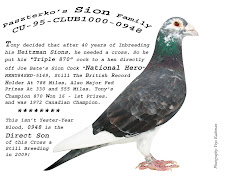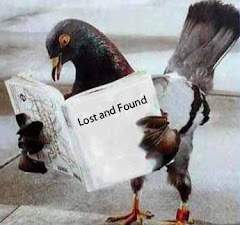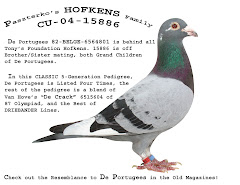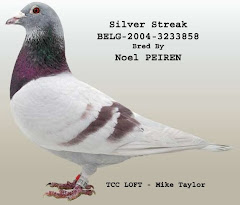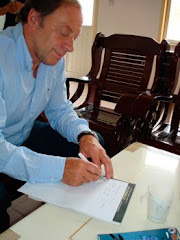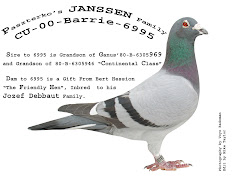John Carreyrou
Wall Street Journal
Nov. 11, 2004
CHELTENHAM, England - After rocking the worlds of cycling and track and field, the scourge of doping is ruffling feathers in another athletic endeavor: pigeon racing.
Gifted with uncanny navigation skills, pigeons have been used to carry messages for centuries. In the early 1800s, people in northern France started racing them. Half a century later, pigeon contests took off in Britain and became the poor man's horse racing. Today the country boasts 50,000 "fanciers," as pigeon trainers are called, and some three million specially bred racing pigeons.
But a pall has been cast on the venerable sport. In Belgium, where the pastime is also popular, scores of pigeons have tested positive for steroids. A number of fanciers have been suspended since the Ministry of Health imposed drug testing in 1995 out of concern for the birds' welfare. In 2001, Belgian police raided 80 homes of breeders and feed-and-medicine suppliers, confiscating large quantities of illegal products that were being used to goose performances.
Until recently, no one had raised questions about the sport in Britain. But a series of sensational race results by fanciers here has sparked grousing that some are feeding their pigeons more than grain.
The 107-year-old Royal Pigeon Racing Association, which is based in this scenic region of western England and counts Queen Elizabeth II among its members, instituted random drug testing in July. The substances banned in the RPRA's 2004 rulebook read like a list of drugs outlawed at the Olympic Games: anabolic steroids, beta-agonists, corticosteroids, opiates, analgesics and synthetic hormones, among others.
So far, the RPRA's 40 tests have all come back negative. But some of the country's top fanciers nevertheless remain under a cloud of suspicion. Among the rumors flying: They are using new drugs that can't be detected, or the drugs have left the pigeons' systems by the time tests are administered. The successful fanciers reply that the doping allegations are sour grapes from jealous rivals.
"I've had a lot of suspicions because of certain performances," says Frank Brammer, an 81-year-old fancier from Gloucester who started racing pigeons in 1937, when he was 14. "Some people who have to win at all cost will dope their pigeons," he says. He adds that he has caught fellow fanciers using other tricks to cheat - such as tampering with race clocks or with pigeons' identification rings.
An incident involving one of Mr. Brammer's birds fanned the doping rumors when the pigeon in question went missing during a race between France and England in May, only to turn up in Canada two months later. A racing pigeon's maximum range is usually around 500 miles, but this bird traveled more than 3,000 miles over the Atlantic Ocean.
Mr. Brammer, who swears he doesn't dope his birds, says it's "fantasy" to think his pigeon could have flown that far, even on drugs. He speculates that it hit some bad weather over the English Channel and took refuge on a passing ship bound for North America.
Pigeons have an impressive ability to find their way home from afar. Scientists believe they use an internal sun clock and an innate ability to read the Earth's magnetic field to guide themselves. The ancient Egyptians, Greeks and Romans all used pigeons to carry messages. In the 12th century, the Caliph of Baghdad had them deliver mail in one of the world's first postal services. When Napoleon was defeated at Waterloo in 1815, Count Nathan Rothschild famously received the news from a pigeon long before anyone else in London, and profited by investing in depressed British government bonds.
In the 19th century, pigeon racing spread from its hub of northern France to Belgium, the Netherlands, Germany and Britain. Today, there are pigeon fanciers in North America, Asia and Africa.
In modern races, pigeons are transported in a big truck to sites hundreds of miles from home and then released. The pigeon that flies back fastest to its loft - the birdhouse where it was born and bred - wins the race. In some races, pigeons are taken as far afield as southern France or Spain and have to find their way back to England.
Performance-enhancing drugs can produce roughly the same effects in pigeons as in human athletes. Anabolic steroids build up a pigeon's muscles. Beta-agonists open its respiratory tract and improve breathing. Both can boost a pigeon's endurance. Corticosteroids, which are administered in eye drops, delay a pigeon's molting, enabling it to train harder and race later in the season.
The incentive to cheat is in large part financial. Fanciers can earn big money from prizes awarded at races or by betting thousands of pounds among themselves. By far the greatest potential for gain comes from selling champion cocks and hens for breeding. One pigeon with a particularly impressive record of victories fetched a record pound sterling 177,000, or about $328,000.
Anxiety grew this year in Britain when some fanciers flew circles around the competition in the country's toughest races. A fancier from Birmingham, Bob Walton, placed seven of his pigeons among the top 36 finishers - including first, second and fourth places - in The Vanrobaeys Gold Ring Classic on Aug. 30. He won $45,158 in prize money and a new car. Mr. Walton's pigeons have since been tested and cleared. He declined to comment for this article.
Mark Evans, a 40-year-old fancier from the town of Whitley Bridge in North Yorkshire, did even better. His pigeons claimed the top six places (and 10 of the top 12 places) in a race that is part of the prestigious Midlands National Championship. When droppings were collected from his birds for testing the day after the stellar performance, rumors began swirling that he had been caught doping them.
The RPRA can't afford the expensive fees of the laboratory the Belgian federation uses at the University of Ghent, so it sends its samples to a horse-testing lab in South Africa. It takes a month for results to come back. During the long wait, Mr. Evans, who also sells pigeons he breeds, got calls from clients "who wanted to know if the rumors about drugs were true," he says. "It hurt our reputation."
He was eventually cleared, yet he says some of his competitors still suspect him of foul play and even refuse to race against him. "Unfortunately, there's a lot of jealousy in this sport," he says. Mr. Evans has won the six-race Midlands National Championship three times in the past four years. He says the reason his pigeons do so well is their elite breeding. "We have the best bloodlines in the world," he says.
Steve Palin, a 42-year-old window washer from Cheltenham who moonlights as a fancier, doesn't believe the doping rumors. Having inherited his passion for the sport from his father, he gets up at 5:30 every morning to feed his pigeons and let them out for an exercise flight. "I honestly don't think most fanciers in this country would use drugs," he says, as he pets Baldy, a strapping champion with a white beak and greenish neck who has won seven races.
The RPRA plans to continue the drug testing next year. Fanciers whose pigeons test positive will be banned from racing for three years. "We'll show people that we do have a clean sport," says Peter Bryant, the association's general manager.
Read more ...







